YOUR Personality in YOUR Garden
Karen Fuoco, The Traveling Gardener

Typically, garden personality is synonomous with garden "decor". Personality can be infused in your garden with unique objects, however, there is so much more to your personality than what is in a found object.
Gardener, know thyself.
Your garden is a reflection of you; all gardens have a personality, whether it is subtle or not. The garden with the most apparent personality is created by the gardener who is self-assured and self aware. A fun garden exercise is to invite strangers into your garden (perhaps invite some garden club members or have an “open garden”) and ask for their honest opinion on the character that your garden displays. Talk about garden therapy! If they can easily identify personality traits like “creative” or “enthusiastic!” or “reserved”, for example, that genuinely reflect your personality, then you have an idea as to how much you have put your heart and soul into your garden.
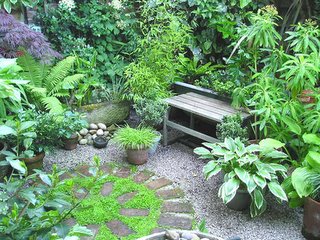 If they do not seem to “understand” your garden then you may be holding back yourself. Fear is one emotion that prevents a gardener from exposing their true personality. There is a fear of killing a plant, of making the design too interesting or unusual. There is a fear of trying new seed varieties or of pruning a living shrub or tree. There is fear of experimentation and that is truly an obstacle in gardening. There is a fear of heights – as in vertical gardening.
If they do not seem to “understand” your garden then you may be holding back yourself. Fear is one emotion that prevents a gardener from exposing their true personality. There is a fear of killing a plant, of making the design too interesting or unusual. There is a fear of trying new seed varieties or of pruning a living shrub or tree. There is fear of experimentation and that is truly an obstacle in gardening. There is a fear of heights – as in vertical gardening.How you garden is an expression of your personality. Some gardeners weed incessantly and others weed only a little. Each gardener expresses their personality in the way they maintain their gardens! For example, my garden is messy because I garden in a rather chaotic way, clipping a plant here and throwing some seed there…energetic and frenzied just like me. The thrown seeds result in a “sprinkling” of poppies or verbena in a hap hazard way, which I feel is magical. I actually leave many seedlings where they choose to grow, even in the middle of some paths or in the gutter of the garden edge. That’s me – not fussy.
I use plants as creative building blocks. Using hens and chicks, I made a three dimensional dinosaur with the hens and chicks as scales and iris for its spikes.
The more personality you put in the garden, the more therapeutic and regenerative gardening is.
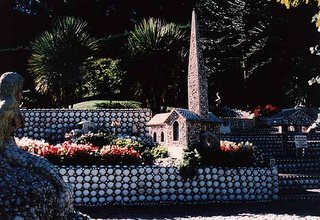 The colours of personality
The colours of personalityThe most intuitive method of expressing your personality in your garden is with colour. Some people scoff at the idea of planting a particular colour, for example coral pink flowers. Instead, they would choose most any other colour. If there is a negative association with a colour then it is most likely is based on a negative experience. One of my friends hates purple because it reminds her of funerals.
Colour themes serve to accentuate a personality. Could it be that the gardener likes to “organize” objects of like characteristics and plant similar colours together? Or if the garden colour theme is red and orange, is it perhaps a reflection of the most extroverted type of person?
I am not fond of “pastels” and consequently I rip out any pastel blooms, keeping only white on my otherwise dark and striking colour palette. However, some gardeners enjoy the calm and subtle greens of a foliage garden.
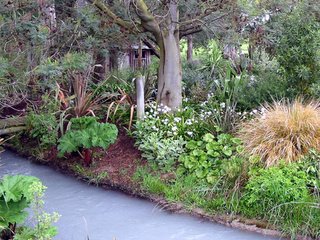 Most of what is written about garden colour is simplistic. For example, red excites and blue calms, yellow is happy. So you like red. Every time you see a plant that blooms red, you buy it and put it into your garden next to a complimenting foliage plant. These actions so far are just good design sense. There is more to your personality than that. Think of why you like red. Are you drawing attention to yourself? Does it remind you of your favourite primary colours in childhood? Perhaps you like exotic environments? If you are using using this colour in any of those contexts, your garden will express so much more about you.
Most of what is written about garden colour is simplistic. For example, red excites and blue calms, yellow is happy. So you like red. Every time you see a plant that blooms red, you buy it and put it into your garden next to a complimenting foliage plant. These actions so far are just good design sense. There is more to your personality than that. Think of why you like red. Are you drawing attention to yourself? Does it remind you of your favourite primary colours in childhood? Perhaps you like exotic environments? If you are using using this colour in any of those contexts, your garden will express so much more about you.Personality through Design
Shape, contour, contrast, materials, silhouette, variation are some of the design aspects which show your garden personality. There is personality reflected in the hardscaping you choose, whether it be paths, arches, trellises, or any other garden “bones”. To find out what personality you expressed in your garden to date, take many black and white photographs of your garden and the surrounding context. Are all the photos in subtle shades of grey? There could be a need for a focus point, a specific object of interest. Are the photos mostly black, showing a lack of variation? You are not a boring person but your garden may be boring to look at.
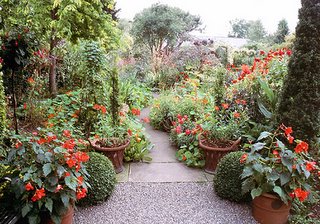 The process of gardening can sometimes be overwhelming and when we are overwhelmed, we are not at our best. To infuse your personality in your garden, concentrate on one small area at a time and design it to your heart’s content. Really think and feel about the area. Would you like to sit there once in a while and enjoy the shade? Does it need a backdrop or do you find yourself being annoyed by the city traffic just beyond? Indulge in sculpting this area into a place full of the smells, sounds and colours that are meaningful to you. Then take another black and white photo. What are the differences from the original photo to the latest photo of your area?
The process of gardening can sometimes be overwhelming and when we are overwhelmed, we are not at our best. To infuse your personality in your garden, concentrate on one small area at a time and design it to your heart’s content. Really think and feel about the area. Would you like to sit there once in a while and enjoy the shade? Does it need a backdrop or do you find yourself being annoyed by the city traffic just beyond? Indulge in sculpting this area into a place full of the smells, sounds and colours that are meaningful to you. Then take another black and white photo. What are the differences from the original photo to the latest photo of your area?Each garden area will present itself to you in a different way. Each time, you have the luxury of choosing specific items, plants and design shapes that are just right for that area. If it helps, name each garden. The name itself will add personality. I have named some of my gardens after my four children. Each garden reflects plants that my children like or that exemplify my children’s’ personalities. You can tie all the little areas together eventually by selecting an element that you like best and duplicating it in all or most of the other areas.
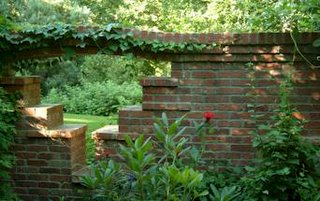 Be brave enough to show all of your personality, not just the socially accepted characteristics. If you like a lot of cottage style garden and a little of the classic style, mesh the two styles together to create a hybrid style all your own.
Be brave enough to show all of your personality, not just the socially accepted characteristics. If you like a lot of cottage style garden and a little of the classic style, mesh the two styles together to create a hybrid style all your own.Childhood memories are rich with personal ideas. Remember back to when you had a tree house or played in a creek or went camping. Running down hills was exhilarating, watching butterflies evoked both delight and intimacy with nature. I could not build a tree house so I built a cabin for my sons. I love running water and someday I will build a meandering rill so I can float boats and leaves and flower blossoms. I love mazes so I made an informal parterre and to my delight, the neighbourhood children love to run around in it. I love Dr Seuss and am inspired to make trees into weird and wonderful shapes, standards, topiaries, and weeping monstrosities. I like secret gardens because they surprises people. I like stairs and bridges because they are elegant passageways.
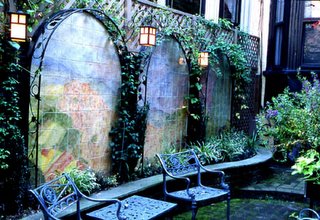 If you can’t make it, fake it. Paint an image of what you cannot have. Paint a faux gate on a wall or embellish a plain wooden bench with details. Paint a fake landscape scene on the side of your house and frame it with shrubs.
If you can’t make it, fake it. Paint an image of what you cannot have. Paint a faux gate on a wall or embellish a plain wooden bench with details. Paint a fake landscape scene on the side of your house and frame it with shrubs.Use the terrain to accentuate personality. Flat is reserved, hilly is energetic. Experiment with bridges, riverbeds, terraces, raised beds, sunken gardens, berms, mazes or dividers. Create the terrain you like despite whatever your land is when you bought it.
For a romantic garden, make use of “cascades” of plants and water. Topiary and pruned trees are cheap ways to add personality. Try opening up the branch structure in a distinctive shape. Mosaics, hand prints or leaf impressions in concrete are like modern hieroglyphics, a tale of the past… If you need a path, perhaps create a “memory lane” of stepping stones.
The emotional garden
Meditation gardens, humorous gardens, theme gardens are some of the types of emotional gardens which are very personal. Playfulness and humour are perhaps the more popular. A music or sound garden would appeal to anyone sensual. Listen to water trickling, seed heads shaking in the wind, poplar trees' distinctive sound in the breeze, the tinkling of metal chimes or the low hollow sound of bamboo chimes… Fragrance evokes emotion as well. I actually like creeping Charlie for it’s crushed aroma as I walk on it. At night, the Brugmansia makes me swoon from its heady fragrance.
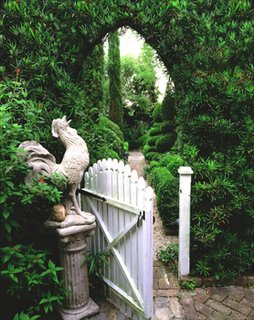
Memory holds emotions for us. I have “sentimental” plants in my garden. That is because I value the meaning behind growing them. The lovely Concord grape vine was started as a cutting from my mother’s vine, which is so old that I remember it growing in my childhood back yard. I was married only a few feet away from it. There is an aster that was given to me by my mother’s best friend Jean. Jean died many years ago and I call it Jean’s aster and remember her every time it blooms.
Mother Nature as nurturer
The more you garden, the more you realize that the garden nurtures the creative and emotional soul within you. It can regenerate your creativity, your body mechanics, and your inquisitive mind. Your personality becomes stronger and more forthright. In my experience with garden design clients, I have noticed that after I have guided and encouraged people to build their own gardens, they become empowered to garden using their own visions and redefine themselves as very capable individuals within their private landscapes.
If you love wildlife, grow butterfly plants like verbena bonariensis. This plant is an excellent substitute for buddleia as it is easier to grow in a zone 5 garden, attracts Monarchs, and has a similar colour to Buddleia.
One year during a cold January, a beautiful ermine appeared inside my house! It visited us for 2 months, eating all the mice in the house and then taking offerings of meat from us. I learned all about how lovely a creature they are and so I always have a “stick pile” in my yard to house such a helpful animal.
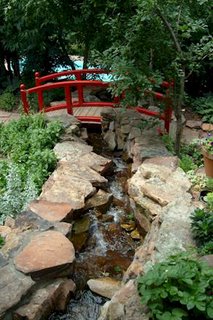 I mulch completely with shredded leaves and do not disturb the delicate ecosystem underneath those leaves. The night crawler worms can be heard rustling under the leaves in the evening dew. The sound of them intrigues me. I plant diverse species to attract more insect life to my garden. I have always loved bugs. I do not use insecticides. My garden practices are about me and my relationship with nature. Seeing a snowberry clearwing moth excites me and gives me great satisfaction that it has visited my flowers.
I mulch completely with shredded leaves and do not disturb the delicate ecosystem underneath those leaves. The night crawler worms can be heard rustling under the leaves in the evening dew. The sound of them intrigues me. I plant diverse species to attract more insect life to my garden. I have always loved bugs. I do not use insecticides. My garden practices are about me and my relationship with nature. Seeing a snowberry clearwing moth excites me and gives me great satisfaction that it has visited my flowers.Since I like to experiment so much in my garden, I never make any permanent structures. I can take apart any path, patio, wall or trellis with relative ease and reuse the materials. This affords so much more flexibility.
A reflection of lifestyle
Ignore trends. Instead, garden in an ecological way and be true to yourself. Try to assess if you are in denial. For example, are you still using insecticides and chemicals in a fanatical way? Why bother? Nature will take its course and fighting it is a losing battle.
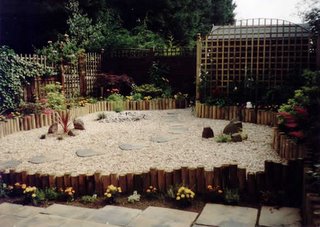 Design according to your specific lifestyle needs. Your needs will be a reflection of your personality. For example, if you need extra living space, design with your interior preferences for furniture, comfort and decor. What you like in your house could be duplicated in the garden.
Design according to your specific lifestyle needs. Your needs will be a reflection of your personality. For example, if you need extra living space, design with your interior preferences for furniture, comfort and decor. What you like in your house could be duplicated in the garden.Garden details or Decor
By studying handwriting, analysts can tell many things about your personality by how you dot your “I’s” and how you cross your “T’s”. In the language of gardens, it is the details that people most often understand the gardener’s personality. A large statue of Buddha will give different information about the gardener as opposed to a scarecrow.
 Signage and signposts are a wonderful way to add personality and function at the same time. Paint ordinary objects a colour that is rare in your garden to give cohesion to chaotic designs. You express your personality whenever you choose an object for garden accents.
Signage and signposts are a wonderful way to add personality and function at the same time. Paint ordinary objects a colour that is rare in your garden to give cohesion to chaotic designs. You express your personality whenever you choose an object for garden accents.Choosing plants that describe our personalities
Whatever garden style(s) you like, plant choices say something about you. A collection of demure, dainty plants can indicate your love of detail in nature, and a fondness for “precious” things. Over sized, broadleaved plants demand attention immediately and can serve as concealers, exclamation marks or drama queens. Dark foliage plants seem mysterious.
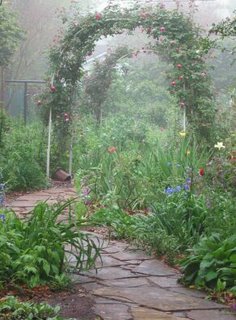 Some gardeners are “collectors” and will have many different variations of the same species. Some gardeners are interested in heirloom plants.
Some gardeners are “collectors” and will have many different variations of the same species. Some gardeners are interested in heirloom plants.I am always on the lookout for the newest and improved varieties of plants. They excite me because I wish to push the growing zone envelope. I look for spectacular colour and am not as intrigued with foliage. But that's my taste...what gives you a gardening thrill?!
Accentuate what you create
Every act of garden creation is a reflection of your personality. Learn to accentuate what you create so your garden will speak your name loudly. It is not only fun to emphasis who you are but it is a way to gain self awareness and confidence.
For your reading pleasure:
http://www.avant-gardening.com/design.html
http://www.gardenaesthetics.com/FORUM.htm
http://www.myidealgarden.com/w/garden-style.html
http://seattletimes.nwsource.com/pacificnw/
2001/0121/cover.html

0 Comments:
Post a Comment
<< Home